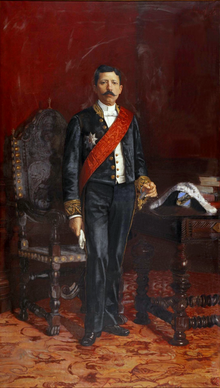João Franco
| João Franco | |
|---|---|
 |
|
| 48th Prime Minister of Portugal | |
|
In office 19 May 1906 – 4 February 1908 |
|
| Monarch | Carlos |
| Preceded by | Ernesto Hintze Ribeiro |
| Succeeded by | Francisco Ferreira do Amaral |
| Personal details | |
| Born |
João Franco Ferreira Pinto Castelo-Branco 14 February 1855 Fundão, Portugal |
| Died | 4 April 1929 (aged 74) Anadia, Portugal |
| Political party | Liberal Regenerator |
| Signature | |
João Franco Ferreira Pinto Castelo-Branco, GCTE (Portuguese pronunciation: [ʒuˈɐ̃w̃ ˈfɾɐ̃ku]; (14 February 1855 in Alcaide, Fundão – 4 April 1929 in Anadia) was a Portuguese politician, minister, 43rd Minister for Treasury Affairs (14 January 1890) and 73rd Prime Minister, in the last years of the Portuguese monarchy.
He was the son of Frederico Carlos Ferreira Franco Freire (16 January 1829 – 1909), a nobleman of the Royal Household, and Luísa Henriqueta Pinto Correia da Costa Castelo-Branco (1835–1893).
He was educated at the University of Coimbra receiving a bachelor's degree in 1875. On entering an administrative career, he was able to prove himself in public competitions for several positions, including: delegate to the royal prosecutor in the comarcas of Sátão, Baião, Alcobaça and Lisbon (between January 1877 and January 1885); service chief of the general administration for customs-houses (from October 1885); administrator general for customs-houses (from February 1886 until December 1886); and court auditor for customs tax litigation (which began in 1886). From his post-University experience, it was obvious that Franco had a spirit and personal energy that would contribute to his partisan conflicts, and formed his role in Portuguese politics. Franco communicated and wrote well which, for the time, gave him advantages in public life, defined by debates and journalistic quarrels. He was rich, had good contacts, appreciated intrigue and immersed in commerce oriented toward service and merit, which united many of the liberal elite of the time.
He was elected for this first time in 1884, for the constituency of Guimarães, and only remained in this position until the Cortes contradicted the will of his electorate. Since the position of delegate and legislative deputy were incompatible, he opted to remain in the legislature, thereby losing his rights in the magistrates offices. Shortly after his election the conflict between Braga and Guimarães occurred, and he dedicated his efforts to support the residents of Guimarães, who had supported his election. The conflict lasted a year, and during that time he exhibited his judicial talents and charter as deputy for Guimarães, receiving sympathies from his electors. During the 1857 legislature, he was responsible for several speeches, covering political, administrative, economic and financial issues, that included issues such as the port of Lisbon, port of Leixões and customs. He regularly sparred with members of Progressive Party (Portuguese: Progressistas) between 1886 and 1890, and his name was associated with the first ministry (government) organized by the Regenerator Party.
...
Wikipedia
